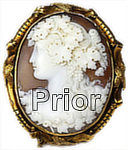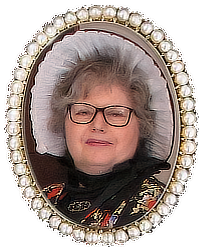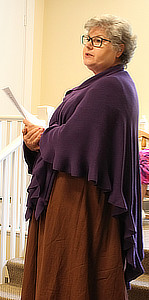
Whittier Cameo
Elizabeth Lloyd Howell
Elizabeth Lloyd Howell

|

|

|
 Played by Sammi Moe
Played by Sammi Moe
 People speculated about us marrying, but he said that he "admired me and respected me too highly to
think of marrying me." Even having said that, John may have been under the impression that we may be
together someday, but it was not to be. I had a growing distaste for Quakers and was becoming an
Episcopalian, and John had no use for the religion.
As we were drifting apart, I wrote and asked him for definite understanding of why we would not be
together - he said his way of life was old fashioned and homey and that he could not bear the restraints
of fashion and society. And that I lived in a different world. Neither of us spent any time lamenting that
we were not to marry.
I ended up marrying Robert Howell. When my husband died in 1853, Whittier came to Philadelphia to
cheer me up, but I was not able to receive him due to ill health. At that point John would have liked to
renew our twenty year friendship. I think his love for me had never died. His health was better, he was
earning more money from his writings, and only had his sister Elizabeth dependent on him. But my
health was not good and I ended up in a sanitarium in Elmira, NY for hydrotherapeutic treatments to
ease my pain.
Years later, Whittier's affection for me was reflected in the poems that he wrote. He even wanted to
dedicate a volume of poems to me. But in the meantime I asked him to destroy letters that I had
written to him. We drifted further apart, I with my beliefs, he with his.
After a visit with me in Princeton, he wrote a poem about a walk we took and sent me a copy. I sent him
an Episcopal sermon hoping that he would have an open mind, but it may have offended him as he
began his letter back with "My Dear Friend," not "Dear Elizabeth" as he had so many times before. Even
though there was no engagement, it was said that I "was the love of his life."
People speculated about us marrying, but he said that he "admired me and respected me too highly to
think of marrying me." Even having said that, John may have been under the impression that we may be
together someday, but it was not to be. I had a growing distaste for Quakers and was becoming an
Episcopalian, and John had no use for the religion.
As we were drifting apart, I wrote and asked him for definite understanding of why we would not be
together - he said his way of life was old fashioned and homey and that he could not bear the restraints
of fashion and society. And that I lived in a different world. Neither of us spent any time lamenting that
we were not to marry.
I ended up marrying Robert Howell. When my husband died in 1853, Whittier came to Philadelphia to
cheer me up, but I was not able to receive him due to ill health. At that point John would have liked to
renew our twenty year friendship. I think his love for me had never died. His health was better, he was
earning more money from his writings, and only had his sister Elizabeth dependent on him. But my
health was not good and I ended up in a sanitarium in Elmira, NY for hydrotherapeutic treatments to
ease my pain.
Years later, Whittier's affection for me was reflected in the poems that he wrote. He even wanted to
dedicate a volume of poems to me. But in the meantime I asked him to destroy letters that I had
written to him. We drifted further apart, I with my beliefs, he with his.
After a visit with me in Princeton, he wrote a poem about a walk we took and sent me a copy. I sent him
an Episcopal sermon hoping that he would have an open mind, but it may have offended him as he
began his letter back with "My Dear Friend," not "Dear Elizabeth" as he had so many times before. Even
though there was no engagement, it was said that I "was the love of his life."